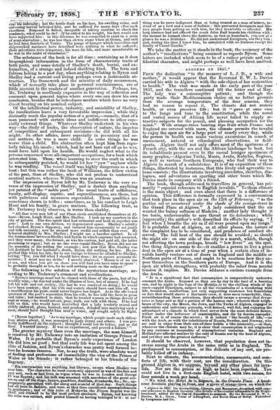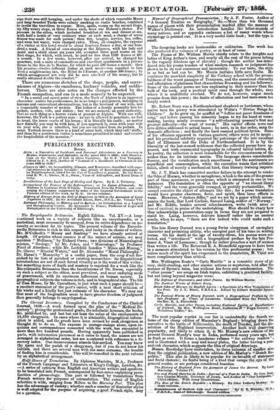ALOIBIL8 IN - 1857.• Enos( the dedication "t,o the memory
of L. J. D., a wife and mother," it would 'appear that the Reverend E. W. L. Davies carried wife to Algiers " with the sole object of her restoration to health." The Visit was made -in the early part of the year 1857, and the travellers continued till the latter end of May. The. lady Was a constiniptive patient; and though the party made their 3l,i,editerrattean choice- on no better grounds than the , average . temperature of the four.seaso44, thu had no reason to repent it. The climate did not, restore health, or -even preserve 'life ; but it " gave , at once ease to the lungs and tone to the donStitution, while the novel and varied scenes of African life never tailed to supply at- tractive subjects for the pencil, and pleasing ocenpatioa for the mind." With orange-trees bearings- ripe fruit when ,France and England are covered with snow,- the climate permits the invalid to 'enjoy the epea air for. alargc part of nearly r:Vertatty, while the person health can Make various exeursions, in search: of amusement, natural or ethnological observations, Or field- sports. Algiers itself not only offers most of the agremens of a French city, with the sea and the African landscape to boot, but its inhabitants present even, to the casual lounger specimen's of many peoples,--Algerine Turks, Moors, Arabs, Kabvles, Negroes, as well as Various Seuthern Europeans, who find: their way to Algiers in Search of a subsistence. It is of an expesition of these things,,illustrated by instances, that this lively and agreeable vo- lume consists; the illustrations involving anecdOtes, sketches, dia.- lognea,r, and adventures on sporting and other tours which Mr. Davies made in company with a friend. The book, though addressed to travellers in general, 'his pris-- manly especial reference te English invalids." To them Climate is the. main object ; and 6i-en:about that there is a difference of opinion. This difference is formally expressed in a conversation that took place in the open air on the 12th,of February, "as the parties sat or stiuntered under the shade of the orange-trees in the Grand Place at Algiers." A lady considered that the air wanted the balmy softness of Madeira ; another lady thought it too tonic, unfavourable to sore throat or tie doloureux ; while (apparently) the author's wife described its efreetsby, saying, ‘! I feel when I breathe the air as if Oil were poured upon piy tUNP." It is probable, that at Algiers, as at other places, the nature of the complaint has to be considered, and snaidence of conduct ob- served. The full heat of the sun should be avoided ; so Should the night air : on one side of the city is a marsh, which, though not affecting the town perhaps, breeds " lo* fever " on the spot. One thing Algiers seems te do—it enables a personi to live a grea.t deal in the open air at- ii time Of year when a certain class Of in- valids hardly venture out of doors in England and the Middle:or Northern parts of France, and ought to be cautious _how -they ex- pose' themselves in the Southern parts of Europe. And it is the open airr, Which strengthens, With probably the relief from mental tension' it. implies. Mi. Davies adduces a curious example from the Arabs. "It is a significant fact that consumption is comparatively unknown amongst the Arabs. Exposed as they are by.day to the heat of a burning sun, and by night to the fogs of the Metidja or to the chilling winds of, the snow-capped Djurdjura, subject to all the vicissitudes of a wandering wild life, houseless, comfortless, not only supporting existence but flourishing on fare that would starve a Dartmoor crow, it does seem remarkable, that., notwithstanding these privations, they should escape a scourge that devas- tates so large and so fair a portion ofthe liftman race; whereas their neigh- bours of the city, the Moors, the Jews, andthe Turks of Algiers, engaged in embroidery. and 'aedentar.y pursuits, well housed, well fed, and enjoying the advantages of a climate in whieb:frost never frets the most delicate flower, wither under the influence , of eommaption, said die by dozens annually. Fresh air is of course' the secret; it ni indeed the breath of life,'—as with the Arab, so with the inhabitants of Russia, Sweden,and Norway' who are said to enjoy front their out-of-door habits a like immunity,—so that, whatever the climate may be, it is dear that consumption is not originated by any extreme or inequality of. atmospherical variation. England and Holland are affected neither by the cold of Russia nor by the heat of Algiers, and yet they are the greatest sufferers."
It should be observed, however, that population does not in- crease among the Arabs in the same ratio as in England. The predisposed to consumption, or the delicate 'of any sort, are pro- bably killed off in infancy.
Next to climate, the accommodations, amusements, and com- forts of life, with their cost, are the Consideration. On this ground Algiers is we suppose - tgonclAco,fy ... place for inva- lids. Nor are the prices lige: ti*A-444hpqn reported, You could not live in a first*tatalnglish hot.' ossitli. twor sun4tior
four pounds A weekiterslleeele kJ_ is., , .seSI tiss
some. fountain playinsv3.1 *grose of.oraegestrees Ale wii "We tried the-IIAtfl, Otibk, the Grmule l'isPfe)-;
. .„.. . . ••
• Algiers in 1857. Its Aecessi14170,imate. and Resoltrifsescathog,WkilpiP4- dal refeience to English Invalithi'cOto'detafts of Recreation obnatahleln its del- bourhood. added for the vicokrirsoners Iry general:. ,By the Bei erend E. W. L. Davies, M.A., Oxon., Vicar of AtIlingfleet, and Rural Dean of Selby. PubliAbed by Longmans and Co. ripe fruit was dill hanging, and under the shade of which venerable Moors and long-bearded Turks were calmly_ smoking on rustic benches, -combined
•
to invite the travellers to repose. Here, again, rooms on the second etage, up fifty weary steps, at three francs each, were our Hobson's choice. For pens-son in the salon, which included breakfast at ten and dinner at six, with half a bottle of very ordinary wine at each meal, a charge of seven francs was made for each person: then --fire, hoagies, service tea, coffee, and even hot water, were charged extra. Thus, all complete, expense ' of a visitor at this hotel would be about fourteen francs a day, or one hun- dred a week. A friend of ours slaying at the Regence, with his lady and maid and a child shout Ai% years old, occupied three good rooms on the first etage, for which, with board, he paid no less than 1200 francs or 48/. a month. In a few weeks, however, after our arrival, he changed his quarters, took a suite of commodious and .excellertt apartments in a private
• hou,se in the Rue de is Marine, for which he paid 300 francs a month: then his pension—twelve different dishes at each meal—was supplied to him from a neighbourieg inn, the Hotel de l'Europe, at another 300 franca; by which arrangement not only dill he save one-half of his money, but he . really obtained -double the comfort."
• There are numerous sketches of the shops, people, and oenve- niences of Algiers—its omnibuses, hackney' vehicles, and saddle- horses. There are also notes on the changes effected by the French occupation, and one in a mode scarcely to be expected.
" In a 'seek.. 1 and moral paint of view, the Turk of Algiers is an improved character: unlike hispredeceseors, he is no longer a polygamist, indulging in luirems and concomitant abominations, but is the husband of one wife, -and a respectable member of society.. The ladies of a family generally live to- ,gether, mother, wife, and sisters ; but we are assured, on good authority, that no such thing as a harem exists at present at Algiers. With one wife, however, theTurk is a jealous man : no eye is allowed to penetrate, no foot to tread, the inner courts of his house ; it is literalla his castle ; no matter howiriendly you may be with him, if you approach it, even with your wife on your arm, she is admitted, but you are excluded from its portals. In some Turkish houses there is a kind of outer hall, which they call skiffa,' and thus far a gentleman visitor is sometimes permitted to enter and receive the hospitalities of-the mansion."



























 Previous page
Previous page